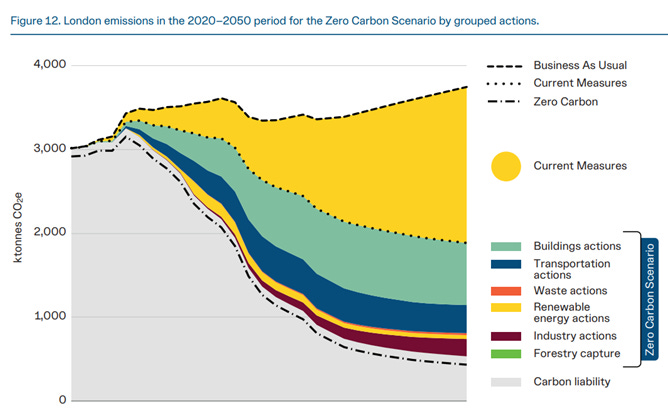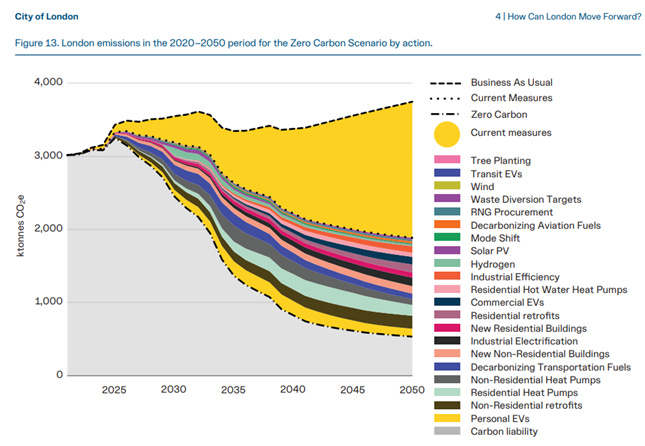Zero Carbon beats Net Zero as a path to climate goals
The City of London has released the 2024 Climate Emergency Action Plan Progress Report, and carbon capture is not going to get us there.
“London’s Climate Action Plan is as much about economic development as climate action.” Yuill Herbert, reporting on the report: “Pathways to Prosperity: June 2025 Climate Action and the Energy Transition in London” at the Strategic Priorities and Planning Committee” on July 17, 2025
Put your expired bank cards to good use by sending them to an Indigenous artist!
Decolonial Solidarity Network is collecting old / expired bank cards on behalf a Niizhiwag Anishinaabe (Two Spirit Ojibwe person) for an upcoming art project.
The artist is accepting whole cards for the big 5 banks (RBC, BMO, TD, CIBC, ScotiaBank). If you prefer to cut up your own cards, please try to make the cuts in a way that makes each piece mostly one colour and keeps smaller logos intact (see above). Email coordination@ds-network.ca for the mailing address.
Decolonial Solidarity, is a solidarity campaign in support of Wet'suwet'en and other Indigenous Nations exerting their sovereignty.
Photo by Louis Hansel on Unsplash
Reported in Corporate Knights by Mark Mann June 24, 2025
McCain (french fries) has a problem: How to build a sustainable, resilient food supply chain for the future. The company commissioned a study in 2018 to assess its vulnerability to the impacts of a rapidly changing climate.
“It showed that if we were to stay on the same trajectory, we would have more and more climate disasters with our crops in the different growing regions around the world.” Entire harvests destroyed by fire, flood or drought, as well as wild swings in yield from year to year.
The solution: a traditional form of farming that preceded industrial monoculture agriculture, protects against droughts and floods, and even offers better returns for farmers – aka, regenerative agriculture.
Their goal: to attain 100% regenerative agriculture across its farms by 2030. Currently, 71% of its farmers are at the onboarding level.
With pipelines dominating much of the conversation on climate, Environmental Defence is working to sharpen their messaging. To ensure this campaign reflects the values and priorities of people across Canada Take this 5-minute survey to share your values and vision for Canada’s future. TAKE THE SURVEY
Federal Petition: Stop Canada’s $24 Billion Nuclear Privatization Deal
This petition calls for an immediate halt to a massive contract that would hand Canada’s nuclear infrastructure to a U.S.-led private consortium — including companies tied to nuclear weapons facilities. It demands a full public audit before any deal moves forward.
Progress Report: London’s Climate Emergency Action Plan
At the July 17th Strategic Priorities and Planning Committee Meeting, a staff report was received that highlighted that London is NOT on track to meet its 2030 climate goals.
Included in the progress report was a consultant’s report: Pathways to Prosperity: Climate Action and the Energy Transition in London, which highlighted how (video at 1:41:10) moving forward with a Zero Carbon strategy could generate $14.3B in cost savings and create 5,000 jobs/year.
A motion was put forward to accept the report and the presentation and:
to forward the report to Deloitte LLP who have been hired to develop the city’s Economic Development Strategy
to reduce the frequency of CEAP reporting from twice a year, to once a year based on the creation of a comprehensive public CEAP dashboard that can be updated throughout the year.
Motion passed 13-2, with Councillors Paul VanMeerbergen and Susan Stevenson opposed.
The Pathways report highlighted two possible scenarios:
Net Zero: rely strongly on carbon capture technologies and less on electrification. This would require a capital investment of $11.7B and return cost savings of $7.3B.
Zero Carbon: rely strongly on electrification and biofuels. This would require a capital investment of $9B and return cost savings of $14.3B.
Also: (video: 1:58) Josh Morgan indicates that the provincial government is working “to move to a 99% emissions free electricity grid by 2050 based on what they call the most significant investment in nuclear technology across the continent.”
This week’s highlight comes from the City of London Climate Emergency Action Plan
7. Pathway to Community Net-Zero Emissions by 2050 7.1. New 2030, 2035, and 2040 Greenhouse Gas Emission Reduction Milestone Targets
(p.27) The following community milestone targets for 2030, 2035, and 2040 will be used (Figure 3):
55 per cent reduction in total annual city-wide emissions by 2030 (about 1.75 million tonnes per year), consistent with the 1.5°C science-based target established by the United Nations Framework Convention on Climate Change’s Race to Zero campaign;
65 per cent by 2035 (about 1.35 million tonnes per year); and
75 per cent by 2040 (about 1 million tonnes per year).
For 2030, this would require a city-wide reduction in annuals emissions of about 1.25 million tonnes from pre-pandemic levels.
Targets adopted by cities are considered “science-based” if they are in line with what the latest climate science deems necessary to meet the goals of the Paris Agreement – limiting global warming to well-below 2°C above pre-industrial levels and pursuing efforts to limit warming to 1.5°C – and reflects a fair share of the 50 per cent global reduction in greenhouse gas emissions by 2030 identified in the United Nations (UN) Intergovernmental Panel on Climate Change (IPCC) Special Report on Global Warming of 1.5°Celsius.
The “fair share” principle reflects the responsibility of nations and cities with high income and high emissions to do more to reduce emissions compared to those with lower income and emissions. Cities in North America, Australia, Japan, and Germany are considered high-income and high-emissions per capita cities.
Sun July 27, 10am, Gibbons Park Queer Intersections monthly hike. Connect with fellow nature enthusiasts, enjoy the fresh air and take in the scenery. Learn more.
Sun July 27 3-4pm Garden Tour: Museum London. Join renowned artist, writer, and gardener Ron Benner for a special garden tour of As the Crow Flies. This immersive garden has been a part of the Museum’s landscape for two decades, showcasing Benner's unique blend of art, horticulture, and environmental stewardship. $15
July 28 - Aug 4, Big Backyard BioBlitz is back! Hosted by Nature Conservancy Canada. Your observations can help scientists and conservation experts map and validate species distributions across the country and monitor changes in ecosystems over time.
Tues July 29 12:00pm Volunteer Seed Collection Newport Forest. Join TTLT in collecting sedge seed from their property near Wardsville. Sedges are an extremely underrated native wetland species that helps maintain healthy habitats by stabilizing soil from erosion while supporting other native plant life around them. By collecting sedge seeds, you can help your local community in growing sustainable natural environments! No knowledge, experience, or equipment is required.
Wed July 30, 6pm-8pm CanBike Level 1: Learn to Ride. Register
Sat Aug 16, 12-4pm Westminster Ponds Centre Happy Habitats Festival 2025 Drop in or stay for the whole day! Scales Nature Park will be doing presentations at 12:00 pm and 2:30 pm, where you'll get the chance to see reptiles up close.
Sat Aug 16, 2pm-4pm, Make and Decorate a Toad House in partnership with Clayworx (a parent with child activity). Museum of Ontario Archaeology. Register
Sat Sept 20, “Hold the Line”, Seniors for Climate rally at Victoria Park in support of 350Canada (email us back if you would like to help organize)
Sat Sept 27 Huron Heights Park, 10am - 2pm Lots of family friendly games and activities. as they celebrate the pilot "Tree Canopy for All" project, in collaboration with Reforest London, London Arts Council, and City of London. FREE admission;
Fridays for Future: PAUSED for the summer
Pathways to Prosperity: Climate Action and the Energy Transition in London: Zero Carbon Pathway
It’s no surprise that de-carbonizing our buildings and transportation are the two big actions to get us to our climate goals. Are you ready to take action? Do you have a plan to replace your furnace or A/C unit for a heat pump? (because we often don’t replace them until they break down - usually at the most inopportune time when we don’t have time to consider different options or apply for grants).
Figure 12 shows GHG emissions reductions by grouped actions for the Zero Carbon Scenario. In this scenario, building actions contribute the most to reductions, accounting for 55% of the emissions reduced between 2021 and 2050.
The second most important reduction occurs in the transportation sector (29%), followed by low-carbon actions in the industrial sector (9%). In 2050 the Zero Carbon Scenario reaches a carbon liability of 545 kilotonnes of CO2e.
Figure 13 shows emissions reductions by actions.
In the buildings sector, results follow the same pattern as in the Net Zero Scenario—the most important actions are
switching the fossil fuels used for heating,
increasing energy efficiency in existing buildings through retrofitting, and
increasing energy efficiency standards for new buildings.
As well, more than half the reductions occur in the non-residential sector, where retrofits and heating create most of the reductions. Retrofitting the non-residential sector is very relevant because it accounts for 75% of the reductions from retrofitting buildings.
For transportation, the most relevant actions are electrifying vehicles and decarbonizing transportation fuels, which produce 90% of the reductions.
In this scenario, personal vehicle electrification results in 76% of the reductions from vehicle electrification.
The third most important action in transportation is switching to sustainable transportation modes, which results in 5% of the sector’s reductions.
Lastly, industrial emissions are reduced by electrifying industrial processes and increasing process efficiency. Electrification reduces 62% of total reductions in industry.











